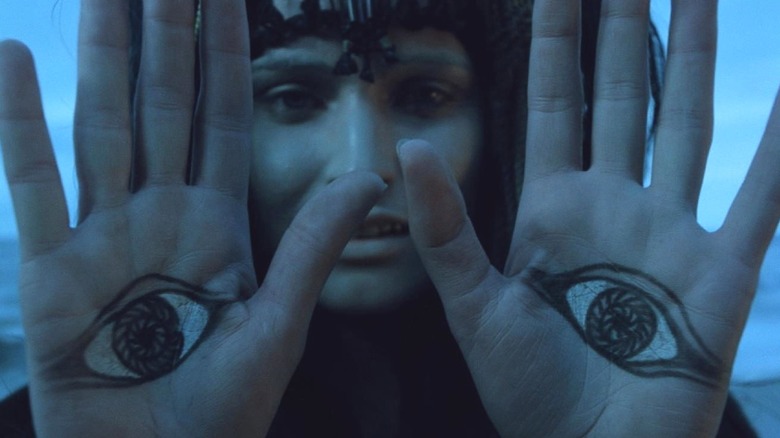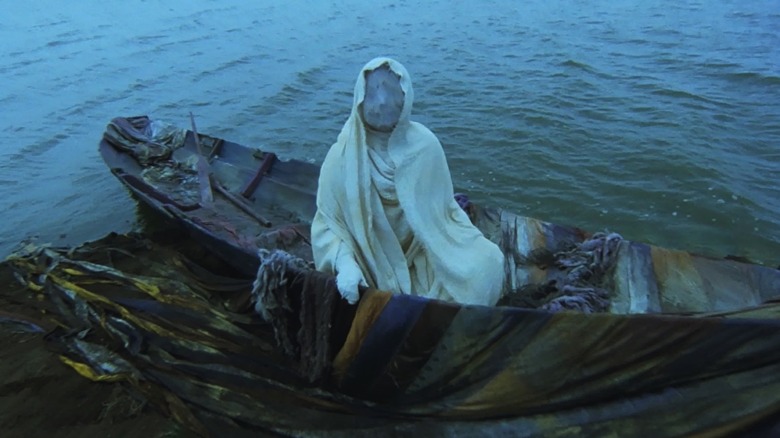This Unfinished And Controversial '70s Sci-Fi Movie Could Have Changed The Genre Forever
The closest Andrzej Żuławski came to becoming a household name was when his only English-language horror, "Possession," was made available to stream on Shudder in 2023. This sudden spotlight drew horror fans towards Żuławski's visceral brand of filmmaking, eventually leading to news of the cult classic horror being remade with Robert Pattinson attached as producer. The journey of "Possession" from almost becoming a lost film to its fairly recent 4K restoration is an inspiring one, as it helped reinvigorate Żuławski's cultural relevance as a director who remained true to his uncompromising vision until the end.
As uncomfortably personal and intense as "Possession" is, it is also Żuławski's most accessible work. Everything else he has obsessively crafted — from the avant-garde "The Third Part of the Night" to the erotically-charged "Szamanka" — was either banned by the Polish government or has remained criminally overlooked since release. The topic of state intervention is integral to Żuławski's career, as it began as early as his second feature (1972's "The Devil) and plagued him until he was able to move to France to create art on his own terms. His "On the Silver Globe" was one such undertaking during the time he had to contend with state censorship, leading to a thematically muted, half-finished sci-fi epic that still carries markers of artistic brilliance.
While production of the film took place between 1976 and 1977, it was abruptly interrupted by the Polish authorities, leading to a delayed release in its unfinished form at Cannes in 1988. While the film was considered 80% complete in 1977, most of it was destroyed by the government, although some of the unfinished reels managed to survive. Near the end of 1985, Żuławski reshot part of the story while adding a voice-over to fill in the missing pieces. However, this rushed, patchwork quilt of a film defies expectation at every turn, demanding our attention with its unsettling atmosphere and astounding interpretation of the genre.
On the Silver Globe is an unfinished space opera, but also Żuławski's magnum opus
"On the Silver Globe" begins with a prologue set in the far future. Here, two researchers resting in a desolate landscape are approached by a rider on horseback, who hands them an object that has apparently fallen from the sky. This object, dubbed the Small Transmission Module, contains the video diary of an astronaut whose craft crashed 60 years ago, setting the stage for the events of the film. We are immediately privy to the aftermath of the crash, where the astronauts land on an unnamed planet and decide to settle on the seashore to rebuild the human race. By this point, if you've already made predictions for what is about to happen, be prepared to be astonished by an epic tale that brims with strange visions about the very nature of existence.
This unnamed planet, it turns out, is not a planet at all, but the moon. As this group starts populating the moon, they realize that the rapidly growing moonchildren (who are distinct from those born on a dying Earth) are indifferent to Earth's established cultures and traditions. This new sect founds its own religion, taking inspiration from dwindling pagan customs, which allows Żuławski to craft the most stunningly absurdist visuals that are peppered with a sense of foreboding. This is an experimental piece of art through and through, where the story unravels through the medium itself, as opposed to dialogue that overtly contextualizes everything (similar to experimental sci-fi anime like "Serial Experiments Lain" or "Texhnolyze," which take the "show, don't tell" sentiment to exciting and bizarre extremes).
The political undertones of "On the Silver Globe" are securely woven into its DNA, which partially explains why the Polish government was so extreme in its crackdown and so hell-bent on erasing the film's existence. But Żuławski persisted, piecing together whatever was left ten years later, even when there was little satisfaction in presenting such a botched, fragmented narrative to the world. Some scenes remain censored, with footage being tacked on top of what's supposed to remain hidden. Instead of looking goofy, these scenes feel innately disturbing, as if we're on the brink of discovering something forbidden, but never do.
If even one person ends up seeking out "On the Silver Globe" after reading this, it brings Żuławski closer to being validated and understood as a director. This is Żuławski's "Dune," only prematurely snuffed out even before we reach the point where a misguided young boy takes up the controversial mantle of messiah and heads towards imminent demise.

